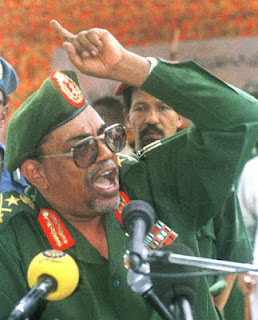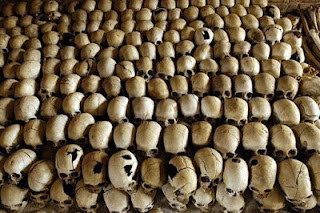Ottilia Anna Maunganidze & Antoinette Louw,
Researcher
& Senior Research Fellow,
Transnational
Threats and International Crimes Division, ISS Pretoria
On 18 July 2012,
Fatou Bensouda, the prosecutor of the International Criminal Court (ICC),
released a press statement confirming receipt of a referral of the situation in
Mali by the country’s interim Minister of Justice. In terms of the 13 July 2012
referral letter, the government of Mali alleges that gross human rights
violations and war crimes have been committed in the country, especially in the
northern region. The alleged crimes include the summary executions of soldiers,
rape of women and young girls, killing of civilians, the recruitment of child
soldiers, torture, pillaging, enforced disappearances, and the destruction of
property (including government buildings, humanitarian installations, religious
establishments and gravesites). The prosecutor indicated that her office would
conduct preliminary investigations into the alleged international crimes in
accordance with the Rome Statute of the ICC.
The referral is
the first received by the new prosecutor since she took office on 15 June this
year. Notably, Mali is the fifth African country that has formally requested
the ICC to investigate crimes in its territory and, if formal investigations
are instituted, will be the eighth situation before the ICC – all of which are
in Africa. This additional African situation comes at a time when the ICC is
under fire for not opening investigations in other parts of the world. Some
critics even go so far as to contend that the ICC is targeting Africa.
As the new
prosecutor begins her tenure at the ICC, it is widely agreed that one of her
office’s main challenges is to ensure that the court rebuilds its legitimacy,
especially in Africa. To do so the ICC must open formal investigations into
situations outside the continent. However, this is easier said than done, as
the additional self-referral by Mali – an African country – shows. Although
self-referrals do signify support for the ICC by the governments concerned,
they are not without their own controversies. For the most part, self-referrals
now elicit more scepticism than compliments for the ICC. This has been the case with the self-referrals made by
the governments of Uganda, the Democratic Republic of Congo (DRC) and the
Central African Republic (CAR), as well as the Côte d’Ivoire case, which –
although not a member of the ICC’s Rome Statute – requested the ICC’s
intervention after accepting the court’s jurisdiction. In all four cases,
allegations are that these requests were intended to cripple government
adversaries rather than end impunity for grave crimes, or that the cases
represent `victor`s justice` rather than real justice for all sides to the
conflict.
Similar
criticisms are likely to be levelled at the Mali referral for a number of
reasons. Politically, the stakes for control over a new government are now
high. The violence that grips the country followed a coup d’état staged by
mutinying soldiers. The coup, which began on 21 March 2012 when soldiers seized
the presidential palace, state media and other buildings, forced then president
Amadou Toumani Touré into hiding and eventually led to his resignation on 8
April. Consequently, the country’s constitution was suspended. The situation in
Mali prior to and after the coup has been tense. At present, an interim
government – comprised mostly of technocrats – that was formed following the
resignation of the president is running the country. This situation has been
exacerbated by the Tuareg insurgency in the north of the country, where rebels
have taken control of most of northern Mali and declared the independent nation
of Azawad. The self-referral could thus be characterised as an attempt by the
interim government – which is weak and in search of support and legitimacy both
locally and abroad – to put down the rebellion in the north, and eliminate
opposition from those who might seek to destabilise a new government.
The political
context aside, the Mali referral nevertheless signals welcome and continued
support for the ICC and its goals in Africa. First, Mali’s decision to refer
shows that the government would like to see an end to the commission of
international crimes within the country and that it believes the ICC can help
in achieving this. Second (and unlike any of the other self-referrals), the
Mali referral has the support of the West African region: on 9 July 2012
ECOWAS’ Contact Group on Mali (composed of Benin, Burkina Faso, Côte d’Ivoire,
Liberia, Niger, Nigeria and Togo) recommended that the situation be referred to
the ICC. The seven-country contact group also called for the formation of a
government of national unity, having already (on 15 May) released a statement
accusing the military junta of blocking the return to civilian rule and
threatening to impose sanctions.
With political
support from both Mali and ECOWAS in place it is now up to the ICC to proceed
in a manner that mitigates the criticisms that have been levelled at the other
self-referrals. A procedural and transparent approach that emphasises the
requirements of the Rome Statute at every step will assist in this regard. For
example, if the ICC initiates formal investigations in Mali, it will be doing
so in line with article 17 of the Rome Statute that allows the court to
intervene only if the government in the country concerned is unwilling or
unable to take action. Noting that Mali’s current government is an interim
administration, it is unlikely to have the capacity to prosecute the alleged
perpetrators itself even if the political will to do so exists. Thus a referral
by Mali signifies commitment by the state to end impunity and paves the way for
future cooperation with the ICC in respect of investigations and possible
arrests. (It is worth noting that this is an important consideration that lends
support to cases coming to the ICC via self-referrals: the court lacks its own
police force, which means it relies heavily on the cooperation of the states in
which it works. Practically, self-referrals are understandably an attractive
option for the ICC.)
The ‘willing and
able’ test referred to above forms part of the ICC Office of the Prosecutor
(OTP)’s obligations under article 53 of the Rome Statute to determine whether
there is a reasonable basis to proceed with an investigation into the situation
in Mali. To do this, the prosecution must determine whether the ICC has
jurisdiction, whether the matter is admissible, and whether proceedings would
be in the interests of justice. If the OTP decides to proceed, it is imperative
that investigations cover all sides to the conflict from the outset in order to
offset accusations that self-referrals result in victor’s justice. These
procedures, and their outcomes, need to be publicly explained by the OTP. This
is neither an unreasonable requirement nor something foreign to the work of a
prosecutor. At the national level prosecutions do not occur in a vacuum, with
local courts similarly being vulnerable to abuse by political leaders
determined to sideline their opposition. The onus is therefore on the OTP to
carefully manage the selection of cases and subsequent investigations and
prosecutions. Doing so will help ameliorate negative perceptions about the ICC.
Although
it’s still early days, the OTP’s statement on the Mali self-referral
demonstrates an awareness of the sensitivities around these types of cases. In
her statement Bensouda outlines clearly the origins of the referral, and the
steps, in terms of the Rome Statute, that the OTP will now take to determine
whether a formal investigation can be launched. This approach is a good start
and should assist the ICC in building its legitimacy despite the addition of
yet another African situation to the court’s caseload.











